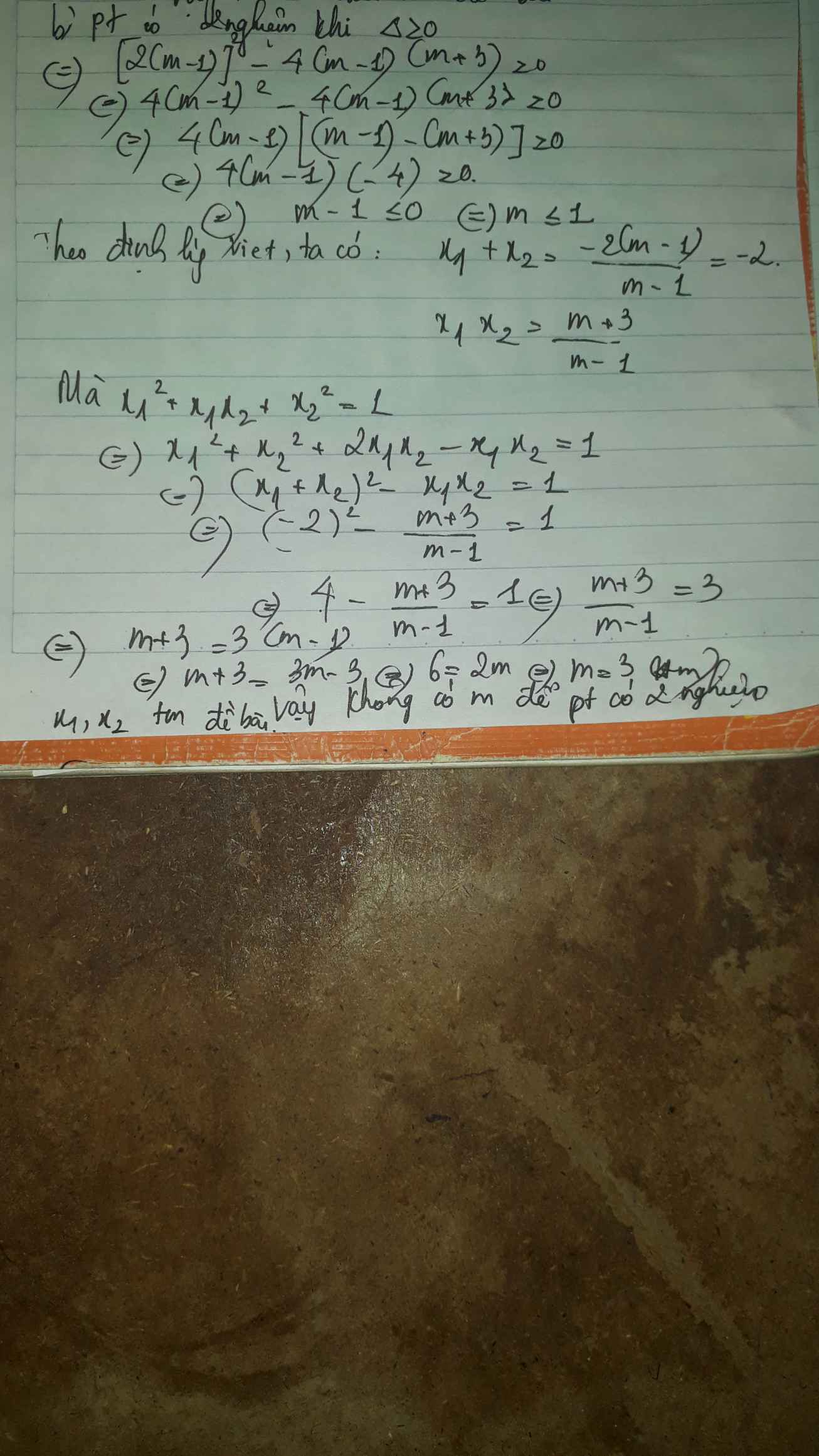Hãy nhập câu hỏi của bạn vào đây, nếu là tài khoản VIP, bạn sẽ được ưu tiên trả lời.

\(\Delta=m^2+12>0\) ; \(\forall m\)
\(\Rightarrow\) Khi \(n=0\) thì pt có nghiệm với mọi m
Theo hệ thức Viet: \(\left\{{}\begin{matrix}x_1+x_2=-m\\x_1x_2=n-3\end{matrix}\right.\)
Ta có: \(\left\{{}\begin{matrix}x_1-x_2=1\\x_1^2-x_2^2=7\end{matrix}\right.\) \(\Leftrightarrow\left\{{}\begin{matrix}x_1-x_2=1\\\left(x_1+x_2\right)\left(x_1-x_2\right)=7\end{matrix}\right.\)
\(\Leftrightarrow\left\{{}\begin{matrix}x_1-x_2=1\\x_1+x_2=7\end{matrix}\right.\) \(\Rightarrow\left\{{}\begin{matrix}x_1=4\\x_2=3\end{matrix}\right.\)
Thế vào hệ thức Viet: \(\left\{{}\begin{matrix}4+3=-m\\4.3=n-3\end{matrix}\right.\) \(\Rightarrow\left\{{}\begin{matrix}m=-7\\n=15\end{matrix}\right.\)

a. Khi m=2 thì (1) có dạng :
\(x^2-6\left(2-1\right)x+9\left(2-3\right)=0\\ \Leftrightarrow x^2-6x-9=0\\ \Leftrightarrow\left(x-3\right)^2=18\Leftrightarrow x-3=\pm\sqrt{18}\\ \Leftrightarrow x=3\pm3\sqrt{2}\)
Vậy với m=2 thì tập nghiệm của phương trình là \(S=\left\{3\pm3\sqrt{2}\right\}\)
b. Coi (1) là phương trình bậc 2 ẩn x , ta có:
\(\text{Δ}'=\left(-3m+3\right)^2-1\cdot9\left(m-3\right)=9m^2-18m+9-9m+27\\ =9m^2-27m+36=\left(3m-\dfrac{9}{2}\right)^2+\dfrac{63}{4}>0\)
Nên phương trình (1) luôn có 2 nghiệm x1,x2 thỏa mãn:
\(\left\{{}\begin{matrix}x_1+x_2=6\left(m-1\right)\\x_1x_2=9\left(m-3\right)\end{matrix}\right.\left(2\right)\)
Vì
\(x_1+x_2=2x_1x_2\\ \Leftrightarrow6\left(m-1\right)=18\left(m-3\right)\Leftrightarrow m-1=3m-9\\ \Leftrightarrow2m=8\Leftrightarrow m=4\)
Vậy m=4
b) Ta có: \(\text{Δ}=\left[-6\left(m-1\right)\right]^2-4\cdot1\cdot9\left(m-3\right)\)
\(=\left(6m-6\right)^2-36\left(m-3\right)\)
\(=36m^2-72m+36-36m+108\)
\(=36m^2-108m+144\)
\(=\left(6m\right)^2-2\cdot6m\cdot9+81+63\)
\(=\left(6m-9\right)^2+63>0\forall m\)
Suy ra: Phương trình luôn có hai nghiệm phân biệt với mọi m
Áp dụng hệ thức Vi-et, ta có:
\(\left\{{}\begin{matrix}x_1+x_2=6\left(m-1\right)=6m-6\\x_1\cdot x_2=9\left(m-3\right)=9m-27\end{matrix}\right.\)
Ta có: \(x_1+x_2=2x_1\cdot x_2\)
\(\Leftrightarrow6m-6=2\left(9m-27\right)\)
\(\Leftrightarrow6m-6-18m+54=0\)
\(\Leftrightarrow-12m+48=0\)
\(\Leftrightarrow-12m=-48\)
hay m=4
Vậy: m=4

b) phương trình có 2 nghiệm \(\Leftrightarrow\Delta'\ge0\)
\(\Leftrightarrow\left(m-1\right)^2-\left(m-1\right)\left(m+3\right)\ge0\)
\(\Leftrightarrow m^2-2m+1-m^2-3m+m+3\ge0\)
\(\Leftrightarrow-4m+4\ge0\)
\(\Leftrightarrow m\le1\)
Ta có: \(x_1^2+x_1x_2+x_2^2=1\)
\(\Leftrightarrow\left(x_1+x_2\right)^2-2x_1x_2=1\)
Theo viet: \(\left\{{}\begin{matrix}x_1+x_2=-\dfrac{b}{a}=2\left(m-1\right)\\x_1x_2=\dfrac{c}{a}=m+3\end{matrix}\right.\)
\(\Leftrightarrow\left[-2\left(m-1\right)^2\right]-2\left(m+3\right)=1\)
\(\Leftrightarrow4m^2-8m+4-2m-6-1=0\)
\(\Leftrightarrow4m^2-10m-3=0\)
\(\Leftrightarrow\left[{}\begin{matrix}m_1=\dfrac{5+\sqrt{37}}{4}\left(ktm\right)\\m_2=\dfrac{5-\sqrt{37}}{4}\left(tm\right)\end{matrix}\right.\Rightarrow m=\dfrac{5-\sqrt{37}}{4}\)

a) Xét pt \(x^2-\left(2m-3\right)x+m^2-3m=0\)
Ta có \(\Delta=\left[-\left(2m-3\right)^2\right]-4.1\left(m^2-3m\right)\)\(=4m^2-12m+9-4m^2+12m\)\(=9>0\)
Vậy pt đã cho luôn có 2 nghiệm phân biệt với mọi m.
Câu b mình nhìn không rõ đề, bạn sửa lại nhé.

a, Thay m vào pt ta được :
(3+1).x2-2(3+1).x+3-3=0
\(\Leftrightarrow\)4x2-8x=0
\(\Leftrightarrow4x\left(x-2\right)=0\)
\(\Leftrightarrow\left[{}\begin{matrix}x=0\\\\x-2=0\end{matrix}\right.\)
\(\Leftrightarrow\left[{}\begin{matrix}x=0\\x=2\end{matrix}\right.\)
Vậy m=3 phương trình có 2 nghiệm là 0 và 2
b, Theo Vi et ta có :
\(\left\{{}\begin{matrix}x_1.x_2=\dfrac{m-3}{m+1}\\x_1+x_2=\dfrac{2\left(m+1\right)}{m+1}\end{matrix}\right.\left(vớim\ne-1\right)\)
\(\Leftrightarrow\left\{{}\begin{matrix}x_1.x_2=\dfrac{m-3}{m+1}\\x_1+x_2=2\end{matrix}\right.\) (1)
Ta có : (4x1+1)(4x2+1)=18
\(\Leftrightarrow16x_1.x_2+4x_1+4x_2+1=18\)
\(\Leftrightarrow16.x_1.x_2+4\left(x_1+x_2\right)=17\) (2)
Thay (1) vào (2) ta được :
16.\(\dfrac{m-3}{m+1}+4.2=17\)
\(\Leftrightarrow\dfrac{16m-48}{m+1}=9\)
\(\Leftrightarrow9\left(m+1\right)=16m-48\)
\(\Leftrightarrow9m+9=16m-48\)
\(\Leftrightarrow7m=57\)
\(\Leftrightarrow m=\dfrac{57}{7}\) (thỏa mãn m\(\ne-1\))
Vậy ..

a, bạn tự làm
b, Thay x = 3 vào pt trên ta được
\(9-3m-3=0\Leftrightarrow6-3m=0\Leftrightarrow m=2\)
Thay m = 2 vào ta được \(x^2-2x-3=0\)
Ta có a - b + c = 1 + 2 - 3 = 0
vậy pt có 2 nghiệm x = -1 ; x = 3
c, \(\Delta=m^2-4\left(-3\right)=m^2+12>0\)
vậy pt luôn có 2 nghiệm pb
\(x_1x_2+5\left(x_1+x_2\right)-1997=0\)
\(\Rightarrow-3+5m-1997=0\Leftrightarrow5m-2000=0\Leftrightarrow m=400\)

a) Điều kiện để phương trình có hai nghiệm trái dấu là :
\(\left\{{}\begin{matrix}m\ne0\\\Delta phẩy>0\\x_1.x_2< 0\end{matrix}\right.\)
\(\Leftrightarrow\left\{{}\begin{matrix}m\ne0\\m^2+4m+4-m^2+3m>0\\\dfrac{m-3}{m}< 0\end{matrix}\right.\)
\(\Rightarrow0< m< 3\)
b) Để phương trình có 2 nghiệm phân biệt thì : \(\Delta\) phẩy > 0
\(\Rightarrow m< 4\)
Ta có : \(\dfrac{1}{x_1^2}+\dfrac{1}{x_2^2}=2\)
\(\Leftrightarrow x_1^2+x_2^2=2x_1^2.x_2^2\)
\(\Leftrightarrow\left(x_1+x_2\right)^2-2x_1.x_2=2x_1^2.x_2^2\)
Theo Vi-ét ta có : \(x_1+x_2=\dfrac{-2\left(m-2\right)}{m};x_1.x_2=\dfrac{m-3}{m}\)
\(\Rightarrow\dfrac{4\left(m-2\right)^2}{m^2}-2.\dfrac{m-3}{m}=2.\dfrac{\left(m-3\right)^2}{m^2}\)
\(\Leftrightarrow m=1\left(tm\right)\)
Vậy...........
a) \(mx^2+2\left(m-2\right)x+m-3=0\left(1\right)\)
Để \(\left(1\right)\) có hai nghiệm trái dấu \(\Leftrightarrow\left\{{}\begin{matrix}\Delta'=\left(m-2\right)^2-m\left(m-3\right)>0\\\dfrac{m-3}{m}< 0\end{matrix}\right.\)
\(\Leftrightarrow\left\{{}\begin{matrix}m^2-4m+4-m^2-3m>0\\0< m< 3\end{matrix}\right.\) \(\Leftrightarrow\left\{{}\begin{matrix}7m+4>0\\0< m< 3\end{matrix}\right.\)
\(\Leftrightarrow\left\{{}\begin{matrix}m>-\dfrac{4}{7}\\0< m< 3\end{matrix}\right.\) \(\Leftrightarrow0< m< 3\)
b) \(\dfrac{1}{x^2_1}+\dfrac{1}{x^2_2}=2\Leftrightarrow\dfrac{x^2_1+x_2^2}{x^2_1.x^2_2}=2\) \(\Leftrightarrow\dfrac{\left(x_1+x_2\right)^2-4x_1.x_2}{x^2_1.x^2_2}=2\)
\(\Leftrightarrow\left(\dfrac{x_1+x_2}{x_1.x_2}\right)^2-\dfrac{4}{x_1.x_2}=2\)
\(\Leftrightarrow\left(\dfrac{\dfrac{2\left(2-m\right)}{m}}{\dfrac{m-3}{m}}\right)^2-\dfrac{4}{\dfrac{m-3}{m}}=2\)
\(\Leftrightarrow\left(\dfrac{2\left(2-m\right)}{m-3}\right)^2-\dfrac{4m}{m-3}=2\)
\(\Leftrightarrow4\left(2-m\right)^2-4m\left(m-3\right)=2.\left(m-3\right)^2\)
\(\Leftrightarrow4\left(4-4m+m^2\right)-4m^2+12=2.\left(m^2-6m+9\right)\)
\(\Leftrightarrow16-16m+4m^2-4m^2+12=2m^2-12m+18\)
\(\Leftrightarrow2m^2+4m-10=0\)
\(\Leftrightarrow m^2+2m-5=0\)
\(\Leftrightarrow\left[{}\begin{matrix}m=-1+\sqrt[]{6}\\m=-1-\sqrt[]{6}\end{matrix}\right.\) \(\Leftrightarrow m=-1+\sqrt[]{6}\left(\Delta>0\Rightarrow m>-\dfrac{4}{7}\right)\)

Điều kiện có nghiệm tự làm nha
Theo vi-et và đề bài ta có:
\(\hept{\begin{cases}x_1=x_2^2\left(1\right)\\x_1x_2=\frac{\left(m-3\right)^3}{3}\left(2\right)\\x_1+x_2=6m\left(3\right)\end{cases}}\)
Lấy (1) thế vô (2) được
\(x_2^3=\frac{\left(m-3\right)^3}{3}\)
\(\Leftrightarrow x_2=\frac{m-3}{\sqrt[3]{3}}\)
Làm nốt